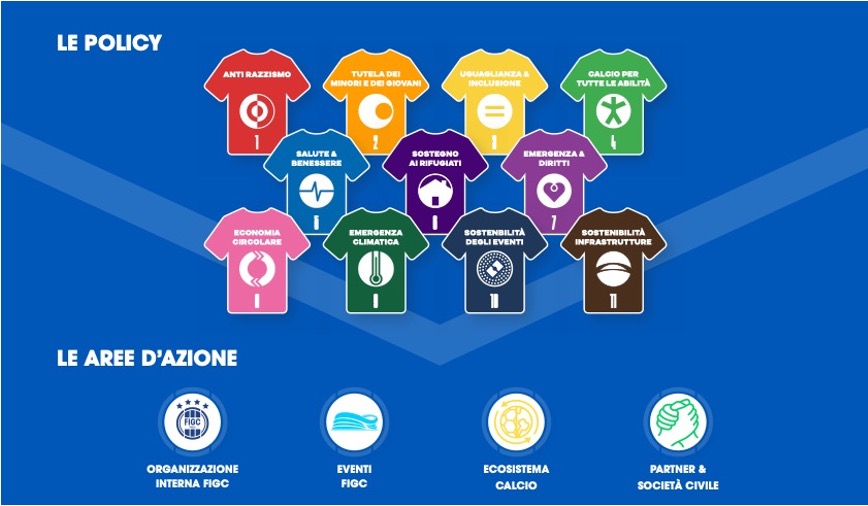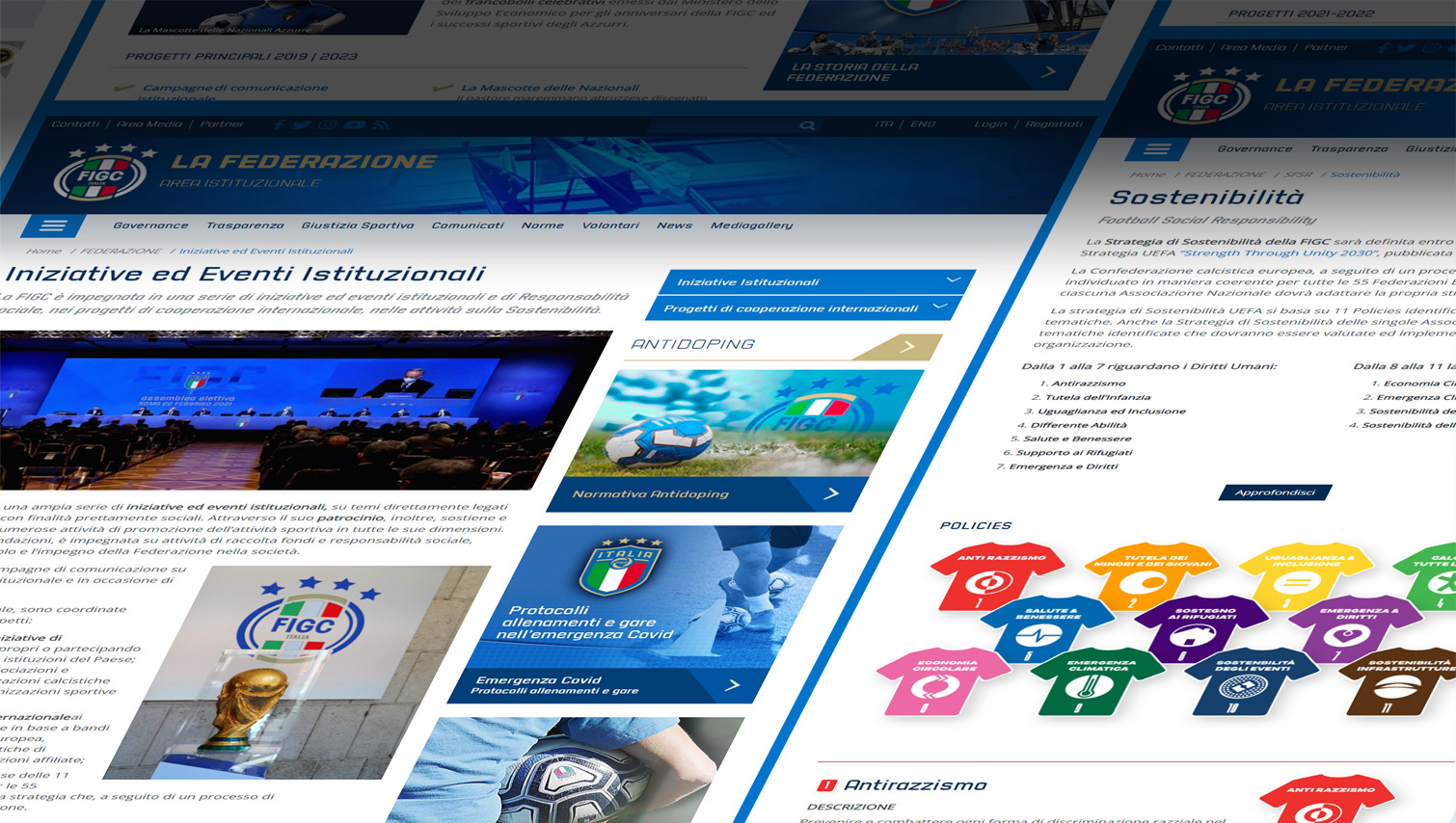
FIGC present the “Sustainability Strategy” for Italian Football
The Federation’s strategic document for socio-environmental sustainability aims to accelerate collective action with respect to human and environmental rights in Italian football. President Gravina: “We are making an important commitment to the new generations and intend to relaunch our integral development action.”Friday, July 21, 2023

Sixty clear, measurable and monitorable strategic objectives that Italian football, as a single ecosystem, intends to achieve by 2030 on eleven different policies, including human rights and environmental protection: these are set out in the 'Sustainability Strategy' presented today by the Federazione Italiana Giuoco Calcio, an ambitious project inspired by the United Nations' 2030 Agenda and UEFA's 'Sustainability Strategy.’
'We are making an important commitment,' commented Federal President Gabriele Gravina, 'towards our stakeholders and the new generations. For some time now, we have been engaged in a conscious process that affects several sectors. Today, thanks also to UEFA’s input, we intend to relaunch our integral development action, defining it with even clearer and more organised objectives and methodologies. Considering the role and impact that it has in Italian society, football has a responsibility that goes beyond the game and the FIGC wants to be a point of reference to ensure the competitiveness of the football system and inspire all its players. We will do this by opening up even more to the outside world, interacting with other bodies and adopting measurable indicators, with a view to accountability and full transparency.”
Sustainability Strategy FIGC
The FIGC is the first sporting federation in Italy to adopt this type of strategic document, which was made in collaboration with LUNDQUIST, a technical-methodological partner. The federation thus makes a clear commitment to the challenge of sustainable development of Italian football, in compliance with the requirements of global sports competition and with the other products of the entertainment industry. And, at the same time, it indicates a new vision of football in a leading role in the process of activating, inspiring and accelerating collective action in the field of human and environmental rights.
Furthermore, the actions and objectives set out in the short, medium and long-term roadmap go hand in hand with the daily governance of the most popular sport in the country. These aims strive to make our football more and more inclusive and socially responsible.
THE 11 POLICIES / AMBITIONS & OBJECTIVES

The document incorporates the 11 spheres of action indicated by UEFA, associating with each of them an ambition to be achieved by 2030: in the social sphere, the FIGC is committed to putting people at the centre, promoting an inclusive and equal space.
On the environmental front, the goal is to reduce the environmental impact and stimulate climate action from everyone involved in Italian football.
| Human Rights | ||
|---|---|---|
|
1 |
Anti-racism Eradicating racism in and out of stadiums |
|
|
2 |
CHILD AND YOUTH PROTECTION Ensuring a safe environment for the growth of young people |
|
|
3 |
EQUALITY AND INCLUSION Ensuring equality, rights and opportunities for all |
|
|
4 |
FOOTBALL FOR ALL ABILITIES Creating an accessible environment without barriers |
|
|
5 |
HEALTH AND WELL-BEING Promoting healthy lifestyles by involving the football community |
|
|
6 |
SUPPORT FOR REFUGEES Being a leader, through football, in the protection and inclusion of refugees |
|
|
7 |
EMERGENCY AND RIGHTS Integrate human rights principles into strategies and take a leadership role in actions of solidarity |
|
| Environmental Protection | ||
|---|---|---|
|
8 |
CIRCULAR ECONOMY Adapt sustainable practices and minimise environmental impact |
|
|
9 |
CLIMATE EMERGENCY Raise awareness and take action for climate change with specialised partners |
|
|
10 |
SUSTAINABILITY OF EVENTS Adhering to the new sustainable event management standards |
|
|
11 |
SUSTAINABILITY OF INFRASTRUCTURE Adopt and share good practices for the renovation and construction of infrastructure |
|
In order to realise its ambitions, the Federation has identified four strategic levers: Synergy with the stakeholders, solid governance to oversee sustainability actions, new partnerships to gain specific skills ad advocacy initiatives to raise awareness among all the parties it addresses.

The FIGC’s action also aims to favour the cascade effect that generates significant and long-lasting impacts, for football and for the country through the involvement, both qualitative and quantitative, of all the different stakeholders of the footballing ecosystem: The Leagues, the Technical Associations, the Clubs, as well as volunteers, sponsors, fans, service providers, the media, communities and local administrations, institutions and the government, each in their respective fields, with their own respective objectives and actions.
SUSTAINABILITY / The dedicated section on figc.it

In order to further amplify the effects of the actions undertaken, in the past few months the FIGC has already launched a specific Sustainability section on the FIGC.it portal, where the UEFA and FIGC Strategies, complete documents and presentation videos are available. For each of the 11 policies identifies, there is a summary of the main projects promoted by the FIGC, by the Sectors (Technical/ Youth and Scholastic) and by the Divisions (Women’s and Paralympic - Experimental). There is a collection of news related to the different stages of development and the progress of the projects. These new items, among other things, are assigned the specific ‘shirt’ with the colour and number of the relevant policy, so that the information on sustainability issues is immediately visible.




